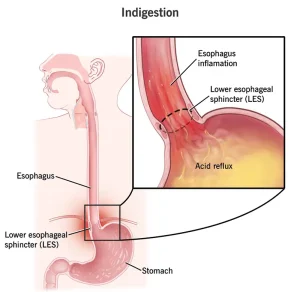Overview
Indigestion, also known as dyspepsia, is a common digestive condition characterized by discomfort or pain in the upper abdomen. It often occurs after eating and may be related to overeating, certain foods, stress, or underlying digestive disorders. Indigestion can be occasional or chronic and affects people of all ages.
Symptoms
-
Upper abdominal pain or discomfort
-
Feeling of fullness or bloating after meals
-
Heartburn or burning sensation in the chest or upper abdomen
-
Nausea or vomiting
-
Excessive belching or gas
-
Loss of appetite
Causes
Indigestion may result from a variety of factors, including:
-
Overeating or eating too quickly
-
Fatty, spicy, or acidic foods
-
Excessive caffeine or alcohol intake
-
Smoking
-
Stress or anxiety
-
Acid reflux or gastroesophageal reflux disease
-
Peptic ulcers or gastritis
-
Certain medications such as pain relievers
Risk factors
-
Irregular eating habits
-
High stress levels
-
Obesity
-
Smoking or frequent alcohol consumption
-
Long-term use of medications that irritate the stomach lining
Complications
Indigestion itself is usually not serious, but persistent symptoms may indicate an underlying condition and lead to:
-
Chronic discomfort affecting quality of life
-
Poor appetite and unintentional weight loss
-
Esophageal inflammation from ongoing acid reflux
-
Delay in diagnosis of more serious gastrointestinal disorders
Prevention
-
Eat smaller, more frequent meals
-
Avoid foods and drinks that trigger symptoms
-
Chew food slowly and thoroughly
-
Maintain a healthy weight
-
Reduce stress through relaxation techniques or exercise
-
Avoid lying down immediately after eating
-
Limit alcohol intake and stop smoking
Most cases of indigestion improve with lifestyle changes and over-the-counter medications. Persistent or severe symptoms should be evaluated by a healthcare professional to rule out underlying conditions.
Advertisement

